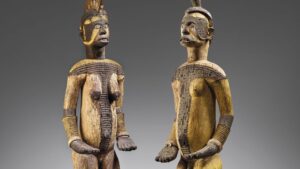Readers may recall from a previous blog post that Facebook Marketplace has become the subject of criticism for playing host to antiquities traffickers selling looted cultural heritage items online. Employing Facebook’s sophisticated algorithms, traffickers quickly connect with buyers receptive to purchasing plundered goods or with less experienced buyers who do not recognize the red flags associated with looted antiquities. Red flags include an origin from a conflict zone (such as Syria or Iraq), lack of provenance or export documents, and comparatively low prices in relation to the object’s scarcity or true value. Online sales have flourished after the looting of cultural heritage sites during and after the Arab Spring, and illicit trafficking of antiquities has been recently exacerbated by the COVID-19 pandemic, which has left many cultural heritage sites defenseless and ripe for plunder. Antiquities as varied as scrolls, coins, and even mummified human remains are sold through online groups. More troubling is the fact that members would discuss how to illegally excavate historical sites. Some members provide tips on how to avoid law enforcement officials, while others make specific “loot to order” requests, deliberately targeting specific objects. The smuggling of Middle Eastern antiquities has been linked to terrorist groups and other crime syndicates. While physical border security may be tightened, it is more difficult to tackle online transactions.
 As a result, groups like the ATHAR Project have been demanding changes. “Athar” is the Arabic word for antiquities, but the name also stands for “Antiquities Trafficking and Heritage Anthropology Research.” Co-Directors Prof. Amr Al-Azm and Katie A. Paul have dedicated the project to ascertaining relationships between the digital underworld, transnational trafficking, terrorism financing, and organized crime. The founders have spoken to media outlets to assist investigations into the issue. In response to this outcry, Facebook announced a change in policy to ban from its marketplace any “content that attempts to buy, sell, trade, donate, gift or solicit historical artifacts.” The change was made effective as of June 23, 2020.
As a result, groups like the ATHAR Project have been demanding changes. “Athar” is the Arabic word for antiquities, but the name also stands for “Antiquities Trafficking and Heritage Anthropology Research.” Co-Directors Prof. Amr Al-Azm and Katie A. Paul have dedicated the project to ascertaining relationships between the digital underworld, transnational trafficking, terrorism financing, and organized crime. The founders have spoken to media outlets to assist investigations into the issue. In response to this outcry, Facebook announced a change in policy to ban from its marketplace any “content that attempts to buy, sell, trade, donate, gift or solicit historical artifacts.” The change was made effective as of June 23, 2020.
Although the ban is an encouraging step towards the eradication of antiquities trafficking, Facebook’s decision is indicative of a larger problem facing the art market: the move to online sales spurred by developments in technology, and more recently the pandemic, has rendered the market more vulnerable to traffickers selling loot. Closing the Facebook Marketplace to “historical artifacts” is perhaps a well-intentioned gesture, but it fails to adequately address the concerns in the larger market. An expert was quoted as suggesting that Facebook should invest in specialized teams to identify and remove criminal networks at their source rather than “playing whack-a-mole with individual posts.”
 As Facebook’s abdication from the marketplace evidences, commercial actors are rarely incentivized to police their salesrooms. Further, the responsibility for reclaiming stolen property falls on the work’s country of origin. Even auction houses, which often carry out due diligence procedures, have been known to allow works with questionable provenance to reach the auction floor (more on this trend below). Relying on nations to recover looted works is problematic. Nations protect their heritage, often through a cultural ministry or national museum. Unfortunately, governments do not have the resources to investigate the global art market or recover property through litigation. Increasing the number of smaller, online sales makes this already Sisyphean task all the more impossible. Some nations monitor the market and confront sellers when questionable works appear on the market. Greece notably faced claims in federal court in New York after it communicated with an auction house about a suspicious item. Fortunately, our client was victorious in defending itself against jurisdiction in the U.S.
As Facebook’s abdication from the marketplace evidences, commercial actors are rarely incentivized to police their salesrooms. Further, the responsibility for reclaiming stolen property falls on the work’s country of origin. Even auction houses, which often carry out due diligence procedures, have been known to allow works with questionable provenance to reach the auction floor (more on this trend below). Relying on nations to recover looted works is problematic. Nations protect their heritage, often through a cultural ministry or national museum. Unfortunately, governments do not have the resources to investigate the global art market or recover property through litigation. Increasing the number of smaller, online sales makes this already Sisyphean task all the more impossible. Some nations monitor the market and confront sellers when questionable works appear on the market. Greece notably faced claims in federal court in New York after it communicated with an auction house about a suspicious item. Fortunately, our client was victorious in defending itself against jurisdiction in the U.S.
On its face, banning cultural heritage items from Facebook Marketplace appears to be a responsible choice. In truth, Facebook is relegating a problem that it helped foster to nations that are already struggling to police the market. Critics of the ban argue that Facebook’s role in the illicit market makes the works more visible and easier for countries to locate. By closing its doors, Facebook has likely pushed these sales deeper into the black market, making them more difficult to track and recover. Further, Facebook indicated that it will not preserve information associated with the sale of artifacts, citing privacy concerns. This means that any information on the site will be destroyed rather than shared with countries of origin. Noting that “theft, pillage or misappropriation of” cultural property violates international law and constitutes a war crime, critics assert that social media evidence has been used by the International Criminal Court to prosecute and convict war criminals as recently as 2017. Facebook is ready to wash its hands of the market for looted antiquities, but in doing so, is neglecting the possibility of using its already established position to counteract the presence of looting on a more effective and direct basis.

The wooden sculptures, one male and one female, represent deities from the Igbo community. Copyright: Christie’s
Facebook is not alone in playing a troubling role in the illicit market. Whereas some traffickers exploit the dark recesses of the internet, others turn to the its most prominent levels in an attempt to legitimize a looted artwork. Due diligence measures have slipped during the COVID-19 pandemic, as buyers and intermediaries have been unable to inspect works personally. Recently, Christie’s was called upon by a prominent art historian to pull two Nigerian statues from a sale in Paris, believing the works were looted during civil war in the 1960s. At the very least, more information would be necessary to determine if the works had been exported illegally. Yet despite these concerns, Christie’s proceeded with the auction. Defending the sale, Christie’s maintained that there wasn’t “any suggestion that these statues were subject to improper export,” prior to the academic’s request. Unfortunately, this response side-steps an inconvenient truth that doubts about provenance may only surface once a work enters the global spotlight, as in an auction house sale. For instance, the lack of prior ownership claims may be due to the item being held in a private collection prior to sale. An official for the Nigerian National Commission for Museums and Monuments said he “was saddened” by the sale, but the country has not yet made a formal demand for repatriation. Despite the controversy, and perhaps encouraged by the lack of action by Nigeria, the piece sold for just under $240,000 (£195,000). Only time will tell whether the statues become the subject of litigation.
It is important for collectors to understand the particularities of acquiring antiquities, and it is important consult knowledgeable professionals to avoid problems. Amineddoleh & Associates has a wealth of experience addressing the challenges faced by foreign nations and private owners. Our founder has served as an expert for a number of high-profile repatriations. (She served as a cultural heritage law consultant in the return of thousands of looted artifacts to Iraq in the “Hobby Lobby” forfeiture, and as a cultural heritage law expert in matters such as the return of an Achaemenid relief to Iran, a golden coffin and mummy parts to Egypt, and a mosaic from one of Caligula’s ships to Italy.) This firm has represented museums, foreign nations, collectors, and sellers in litigations and transactional matters. Moreover, we routinely aid our clients in conducting due diligence to ensure that their purchases are legally permitted and free from encumbrance. As the pandemic continues and online cases soar, savvy purchasers must be as cautious as possible and contact legal counsel familiar with the art market’s pitfalls.